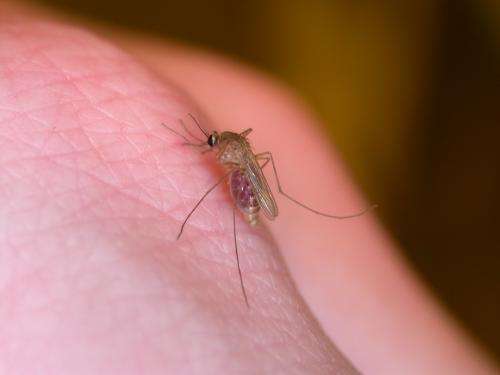It's unclear how recent flooding will impact mosquito populations in Iowa, but the answer should become clear in a few weeks. Credit: Lyric Bartholomay
Recent flooding throughout the state might give mosquito populations a boost. But, then again, it might not.
It's difficult to predict how the rainy weather of recent weeks will impact mosquitoes, said Lyric Bartholomay, an Iowa State University associate professor of entomology and director of the ISU Medical Entomology Laboratory.
Mosquitoes lay their eggs in water and spend the first stages of their development there as well, so it stands to reason that more water means more habitat. But that's not always the case, Bartholomay said.
When rivers and streams swell with excess water, they often generate more powerful current, which can actually wash away developing mosquitoes. Standing water, on the other hand, provides ideal conditions for mosquitoes to lay eggs.
"The earliest stages of a mosquito's lifecycle depend on water," Bartholomay said. "So a lot of standing water left behind for a period of time following a flood can create good habitat for them to develop if the temperatures are right. But it's difficult to tell exactly how mosquitoes will respond to a particular flooding event."
She said we won't have to wait long to find out, however. Under ideal conditions, Bartholomay said mosquitoes spend about a week after they hatch as larvae and only a few days as pupae. After that, they leave the water as adult mosquitoes. If the recent flooding gave Iowa mosquitoes a boost, we should notice in about two weeks, she said.
Bartholomay said the mosquitoes that most Iowans will notice this time of year tend to be "nuisance species," which do not carry viruses such as West Nile. The species that are capable of transmitting diseases to humans are more common later in the summer, she said.
"At this time of the year, and particularly since we've had a chilly spring, we haven't had real opportunity for many mosquitoes to be on the wing and out amplifying the population," she said. "Whatever results from recent flooding will initially be nuisance species that were left behind last year or in years previous."
Bartholomay recommended that Iowans rid their lawns of all standing water to cut down on the available habitat. She said flower pots, gutters and bird baths all have the potential to attract mosquitoes. She also said wearing long sleeves and pants can help, although that's not always practical during hot summer months. Mosquito repellants provide some protection as well as staying indoors around dusk, when mosquito activity is often the heaviest, she said.
Those precautions aren't foolproof, of course, but they can make a big difference for Iowans who spend time outside during the summer.
The ISU Medical Entomology Laboratory tracks the state's mosquito population throughout the summer months and regularly posts updated data at IowaMosquito.net.
Provided by Iowa State University





















